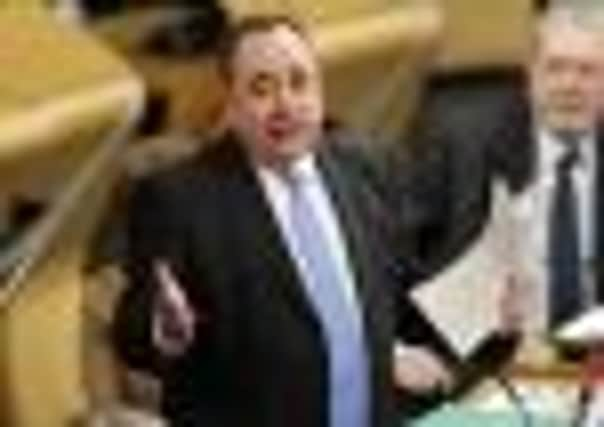Budget 2013: North Sea oil forecast down by £900m


The independent Office for Budget Responsibility (OBR) said North Sea oil and gas cash would amount to £33.9 billion between 2012-13 and 2017-18 – a downward revision of £0.9 bn since the previous estimate last autumn.
The revised prediction led to pro-Union politicians claiming that it punched a hole in the SNP’s argument for an independent Scotland, which is heavily reliant on money made from offshore oil production.
Advertisement
Hide AdAdvertisement
Hide AdThe OBR figures came the day before Mr Salmond is due to announce the date for the 2014 referendum and differ enormously from the far more lucrative scenario predicted by the Scottish Government in its own report earlier this month.
Last week the Scottish Government’s first Oil and Gas Analytical Bulletin said that the off-shore industry would generate between £41bn and £57bn in tax revenue between 2012-13 and 2017-18.
Yesterday’s fresh figures were released by the OBR as George Osborne unveiled his Budget in the House of Commons.
Michael Moore, the Scottish Secretary, said: “There is a gulf between those independent OBR figures and the hugely optimistic numbers published by the Scottish Government last week. Their most optimistic scenario puts revenues in 2017-18 at three times the independent OBR figure, despite the Scottish Government’s own expert group warning them to be cautious and John Swinney’s own leaked Cabinet paper saying that the revenues are volatile and declining.
“The contrast here is between independent OBR figures and an exercise in wishful thinking, with no working attached, from the Scottish Government. This debate must be based on fact, not wishful thinking.”
But finance secretary Mr Swinney said the OBR predictions are deficient in their assumptions of the number of barrels being extracted and in the cost per barrel.
Both factors are being underestimated when compared with other models, including the industry and the UK government’s Department for Energy and Climate Change, he said.
“Essentially, the central point here is that we’re following industry expectations and advice. That is the most robust measure,” Mr Swinney said.
Advertisement
Hide AdAdvertisement
Hide AdLabour MP Margaret Curran, the shadow Scottish secretary, said: “This is another stark warning to the SNP about the volatility of oil revenues. They even go as far as saying that the UK economy shrank more than expected last year due to disrupted production in the North Sea, yet the SNP want to back a whole economy with oil.”
There was also disagreement over Westminster claims that Scotland would benefit from an extra £176 million over the next two years. Mr Moore said that the cash would be targeted at the struggling housing market, but Mr Swinney claimed that the Scottish Government would have limited control over how it was spent.
The Scotland Office said the net extra cash resulted from a £279m increase in capital spending combined with a £103m reduction in the “resource budget”, of day-to-day spending.
The £279m will be made up of a £13m boost for capital spending on affordable housing, plus a £267m share of “loan and equity facilities” under a series of measures to help families struggling with deposits for a home. But Mr Swinney claimed that the measures amounted to a loan to Scotland and said that to present it as an increase in the Scottish Government’s spending power was “deceitful”.
“The Chancellor has taken away £107m of hard cash that we could spend on particular projects of our decision-making and he’s replaced it with loan facilities that will have to be paid back at a later date,” he said.
“That does not translate into a cash boost for capital investment in our economy and that’s the central deceit at the heart of this Budget – an instrument by the Chancellor to make his measures look better than they are.”
The Scotland Office admitted the capital money would be in the form of loans and shared equity but responded to Mr Swinney’s claims by saying the measures would increase Scottish Government spending power.
A Scotland Office spokesman said the cash was “in line” with the approach to the house-building schemes in England, which gave rise to the cash for Scotland in the form of Barnett consequentials, the formula which decides how much Treasury money comes north.
Advertisement
Hide AdAdvertisement
Hide AdThe Scotland Office spokesman said: “The Scottish Government has discretion over this additional funding as long as they use it as a financial transaction and it already plans to use some of its budget for this purpose.”
The spokesman added: “It is for the Scottish Government to determine whether it wishes to use this additional spending power to support construction projects such as housing, as the UK government is doing, or to try and create a row out of it.”
Meanwhile, the Chancellor’s decision to maintain the escalator tax on spirits was greeted with dismay by Mr Swinney and the whisky industry.